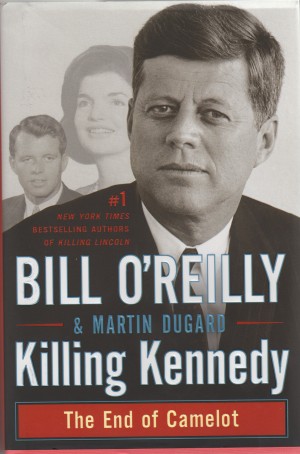Killing Kennedy: The End of Camelot by Bill O’Reilly and Martin Dugard (2012. Henry Holt. ISBN 978-0-8050-9666-8)
This isn’t a great work of literature or a book that will make the critics proclaim that Bill O’Reilly is a great author. That having been said, this rendition of JFK’s life and his ill-fated appointment with Lee Harvey Oswald is portrayed completely and without the sort of ideological rancor that makes O’Reilly such a celebrity on the airwaves. The book’s use of past and present tense and the juxtapositioning of snippets from Oswald’s life with scenes from his target’s better known history all add to the feeling of impending dread that permeates this sad, sad, tale. To be sure, O’Reilly pulls no punches when it comes to his portrayal of Kennedy as a philandering womanizer. But he is careful to add that, after the Cuban Missile Crisis, wherein Jackie insisted upon being in Washington D.C. with her husband and their children if the world was going to end, Kennedy’s dalliances with actresses and employees waned, if not completely disappeared. The portrayal of Kennedy’s changed persona, as rendered by the able hand of the author, includes tender scenes of domesticity that make Jack Kennedy come alive. Memorably, the scene involving the death of infant son Patrick, the last of the couple’s offspring, captures the type of love Kennedy displayed in private for his wife and children:
Patrick Bouvier Kennedy died just two hours later. “He was such a beautiful baby,” the president laments…”He put up quite a fight.”
Kennedy is holding young Patrick’s hand as the child breathes his last. As the president absorbs the terrible moment, he is well aware that his grief is not private. The nurses, doctors, and his own staff watch to see how he handles this awful moment. Slowly, JFK leaves the room and wanders the hospital hallway, keeping his pain to himself.
The assassination sequence is, in a word, riveting. The plot and planning unfold slowly, painfully so, for of course, we know the ending to this story. But it is O’Reilly’s careful, if truncated, examination of Oswald’s troubled psyche and his opaquely inadequate motivation for selecting the president as a target (according to the author, Oswald had no beef with JFK’s politics but simply wanted to be part of a newsworthy event, something that would prove to his estranged Soviet wife that he too was a “great man”) that gives credibility to the author’s views and his rendition of history. The narrative is clear, unencumbered by needless adjectives and adverbs. Just simple, straight forward reportage graces the pages of this book. You’ll learn much about the man who became president and the villain who chose to kill him without a lot of fanfare or political pontificating, the lack of which makes Killing Kennedy a quick and excellent summer read.
4 stars out of 5.



